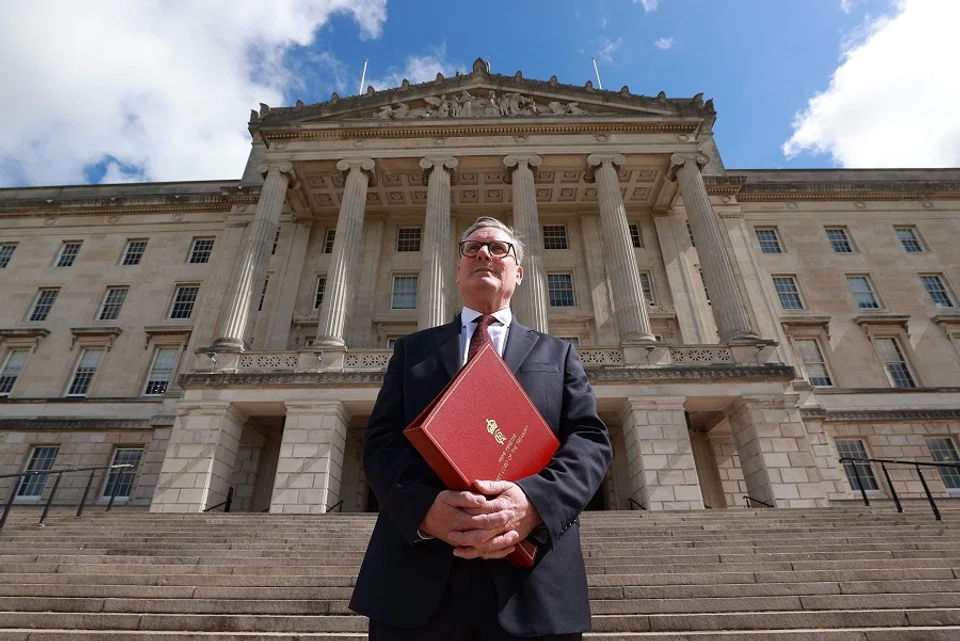UK Labour’s landslide win: Impact on UK-China ties?
The Labour Party has argued that it will develop a “long-term and strategic approach” to managing relations with Beijing, but its approach may not be very different from the last government, says academic Zeno Leoni.

The Labour Party has won the recent UK elections with a landslide victory. With such a result and after 15 years of Conservative rule, expectations for change are certainly justified. Does this also concern Britain’s China policy?
China has become a prominent issue in UK policy circles over the last five years, and it will continue to remain a top priority for several governments to come. Yet whether Labour will manage to distinguish itself from the Conservative Party remains to be seen.
... the Labour Party has argued that it will develop a “long-term and strategic approach” to managing relations with Beijing, following the principle of the three “Cs” — “co-operate where we can, compete where we need to, and challenge where we must”.
Since the end of the David Cameron government in 2016, the “golden era” between the UK and China quickly faded. The relationship with China was securitised by London through the Integrated Review 2021 and the related Refresh 2023.
The former, published by Boris Jonhson’s government, stated that the People’s Republic of China (China) is the “biggest state-based threat to the UK’s economic security”, and that its military modernisation and assertiveness threaten British interests in the Indo-Pacific.
Meanwhile the second document, which mentioned China almost 40 times, stated — echoing the US National Security Strategy 2022 — “China’s willingness to use all the levers of state power to achieve a dominant role in global affairs”, and associated some Chinese actions with “danger, disorder and division”, describing China as an “epoch-defining challenge”.
Inconsistent China policy throughout Conservative years
While Britain’s China policy certainly shifted since the late 2010s compared to the rest of the post-Cold War era, this shift has also led to a series of inconsistencies which have characterised the Conservative governments.
These include struggles to rein in big economic players like HSBC and Standard Chartered amid Downing Street’s condemnations of Hong Kong’s national security law; and Foreign Secretary Dominic Raab’s leaked statement about how the UK “ought to be trading liberally” regardless of the human rights record of commercial partners, alongside a noticeable alignment with Washington on diplomatic and military fronts.
Amid such incoherence, the Labour Party is coming into power with a rich manifesto which, among many other things it — briefly — addresses the question of China. In such a manifesto, titled “Change”, the Labour Party has argued that it will develop a “long-term and strategic approach” to managing relations with Beijing, following the principle of the three “Cs” — “co-operate where we can, compete where we need to, and challenge where we must”.
It, furthermore, wishes to arrive at such an approach after “an audit of our bilateral relationship” in the first few months of the mandate. However, as it was reported in recent months, Labour’s leader Keir Starmer indicated that “a Labour government would not depart from Sunak’s policy of engaging China while seeking to limit security risks”.
Labour’s China policy may not deviate too far
In fact, Labour’s three “Cs” approach to China seems very similar to the Conservatives’ “protect”, “align”, “engage”. Indeed, David Lammy — then shadow secretary of state for foreign, commonwealth and development affairs — wrote in a piece for Foreign Affairs, where he presented his foreign policy vision, that the UK must “adopt a more consistent strategy” that “would recognise that Beijing poses a systemic challenge...and that the Chinese Communist Party poses real security threats” while recognising “China’s importance to the British economy” and the need to cooperate with Beijing on “global threats”.
... a Labour government may seek to distance itself from certain features of a Trump presidency.

As Professor Kerry Brown, director of the Lau China Institute at King’s College, London, put it, despite competing over many other issues, the Conservative Party and the Labour Party “have been largely aligned on their China policy over recent history”, as demonstrated during the last transition of government in 2010 from Labour to Conservative.
It should also be noted that China policies across other Western democracies generally maintain continuity between centre-left and centre-right governments, and they have to balance between economic and security interests.
Human rights an exception
Regarding the UK specifically, observers have noted that the area where a Labour government would likely diverge significantly is on the issue of “human rights”. Labour has already “gone a step further than the Conservatives” when Shadow Foreign Secretary David Lammy pledged to declare a “genocide” in Xinjiang. However, whether this stance will persist now that the party is in government remains uncertain.
There may also be other factors to consider, especially external ones. A victory of Trump in the US will surely lead to pressure on the British government, as it happened during the first Trump administration. However, a Labour government may seek to distance itself from certain features of a Trump presidency. This could lead the next UK government to adopt a nuanced approach in its foreign policy towards China, so that it would not resemble Trump’s foreign policy.
Other aspects to consider involve binding decisions taken by previous British governments. NATO in its Strategic Concept 2022 claimed that events in the Indo-Pacific have an impact in the Euro-Atlantic area, and this has led the UK to increase its cooperation with European partners in the Indo-Pacific. With a Labour government, there may be even more appetite for coordinating with allies on the continent, but in any case, such a stance is unlikely to change. Similarly, AUKUS binds the UK for many decades to come.
BNO holders may not be pleased with Sunak’s China policy to the extent this was perceived as too dovish. It is possible that Labour’s emphasis on human rights earned Keir Starmer votes among them.
Hong Kongers in the UK
Labour’s China policy might also be influenced, to some extent, by Hong Kong watchers and the views of the BNO passport holders. While statistics about how BNO from Hong Kong voted are not available at this stage, it was reported by a survey made prior to the election that “there is no obvious party allegiance for Hong Kongers” and key issues for these citizens remain issues like the state of the economy and the cost of living. That said, they will oppose a policy that is seen as supportive of China.
Indeed, it was reported that the organisation “Hongkongers in Britain” sought to impact on the general election by targeting seats “where the majority is slim enough for the local Hong Kong population to contribute to candidates losing, holding or gaining it”. Other reports suggested that BNO holders may not be pleased with Sunak’s China policy to the extent this was perceived as too dovish. It is possible that Labour’s emphasis on human rights earned Keir Starmer votes among them.

While the importance of the UK-China relationship is often overstated, particularly in economic terms compared to its ties with the EU and the US, the new Labour government does not have an easy task as there will be expectations for both improvement and change in different areas, including Britain’s China policy.
Furthermore, developing a fully coherent China policy is not possible in the real world of economic globalisation under a competitive international system. But the Labour’s audit approach will buy the new government some time and promises to bring fresh ideas into government.



![[Big read] When the Arctic opens, what happens to Singapore?](https://cassette.sphdigital.com.sg/image/thinkchina/da65edebca34645c711c55e83e9877109b3c53847ebb1305573974651df1d13a)
![[Video] George Yeo: America’s deep pain — and why China won’t colonise](https://cassette.sphdigital.com.sg/image/thinkchina/15083e45d96c12390bdea6af2daf19fd9fcd875aa44a0f92796f34e3dad561cc)
